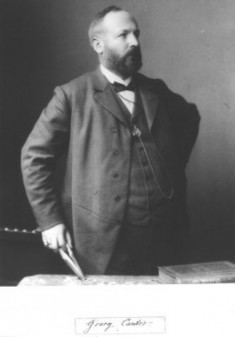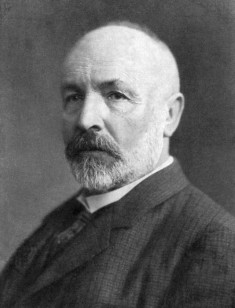Georg Cantor was a popular German mathematician. He is best known as the inventor of set theory that later became a fundamental theory in mathematics. He was able to establish the importance of one-to-one correspondence between members of two sets, well-ordered sets, and defined infinite sets. These proved that real numbers are much more numerous than natural numbers. Actually, his theorem implies the existence of ‘infinity of infinities.’ Georg also defined the ordinal and cardinal numbers and their arithmetic.
Early Life and Education
Georg Cantor was born on March 3, 1845 in St. Petersburg, Russian Empire. He was brought up in the city until he turned 11. He was the oldest of six children and was regarded as a great violinist. His grandfather was a famous musician and the soloist in the Russian Empire in an imperial orchestra. His dad had been a member of the St. Petersburg stock exchange.
In 1856, Georg’s father became ill and moved the family to Germany. They first went to Wiesbaden before going to Frankfurt. They were seeking winters milder than those in St. Petersburg. In 1860, Georg graduated with a distinction from Realschule in Darmstadt. His great skills in mathematics and trigonometry were noted. In 1862, he enrolled at the University of Zurich. This was after receiving his inheritance after his father passed way in 1863. He later shifted to the University of Berlin. He spent the 1866 summer at University of Gottingen.
Teaching and Research Career
In 1867, Georg Cantor completed his dissertation on number theory while at the University of Berlin. He briefly taught in a girl’s school before taking up a position at the University of Halle. He spent his entire career here and was awarded the requisite habilitation for his thesis and number theory that he presented in 1869 after his appointment at Halle.
In 1872, Georg was promoted to Extraordinary Professor and in 1879, he was made full Professor. Having attained this rank at only 34 years old, this was a great achievement. However, Georg Cantor wanted a chair at a much more prestigious university in Berlin. This could not be made possible since his work encountered too much opposition.
Contribution to Mathematics
At the beginning of his career, Georg was actively involved with mathematical guilds and other societies. In 1865, he became the first president of the Deutsche Mathematiker-Vereinigung society and in 1868, he joined the Schellbach seminar for mathematics. He also worked on the number theory and analysis.
In Halle, he decided to probe further into trigonometry and even started pondering over the uniqueness of the representation of a function of trigonometric series. By 1873, Georg proved that rational numbers were countable and could also be placed in correspondence to natural numbers.
Cantor’s Other Works
In 1882, Georg Cantor started an important correspondence with Gosta Leggler. He soon started publishing his works in Leffer’s journal called Acta Mathematica. Although he continued publishing, he suffered a mental breakdown in 1884. Luckily, he recovered soon enough and decided to lecture in philosophy. He also began studying Elizabethan literature.
Other major works by Georg Cantor includes uncountable sets, the Cantor set, infinite sets, convergent series, the continuum hypothesis, infinitesimals, number theory and function theories, among many others. For his works in mathematics, he was awarded the Sylvester Medal.
Personal Life
 In 1874, Georg married Vally Guttman. Together, the couple had six children. Most biographers say he suffered from financial difficulties. He did not have enough funds to support his family despite being a reputed mathematician. During his free time, he used to play violin and also studied arts and literature.
In 1874, Georg married Vally Guttman. Together, the couple had six children. Most biographers say he suffered from financial difficulties. He did not have enough funds to support his family despite being a reputed mathematician. During his free time, he used to play violin and also studied arts and literature.
In 1884, Georg encountered his first bout of depression; criticism of his work weighed on his mind. In 1913, he retired from work. After this, he suffered from mental illness and was a victim of continuous breakdowns. He was finally admitted to a sanatorium.
On January 6, 1918, Georg Cantor died in Halle following a prolonged mental illness. There were many publications about him, such as Men of Mathematics and History of Mathematics. Georg helped lay a foundation for modern day mathematics. Most of his works survive even today.
